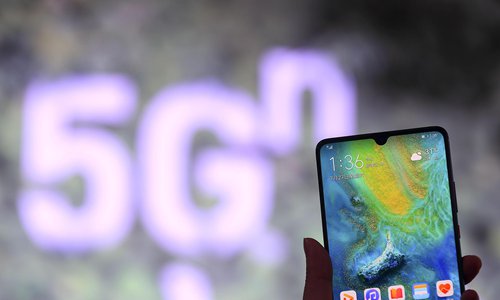Huawei reports strong H1 performance
US attacks don’t hurt nation’s best-known technology firm

A person holds a 5G Huawei smartphone in Taiyuan, North China's Shanxi Province on Saturday. Photo: VCG

Photo: Global TImes
Chinese telecom giant Huawei Technologies on Tuesday reported a robust first-half financial performance despite facing harsh sanctions from the Trump administration intended to destroy the global 5G leader.
The company said that its revenue rose 23.2 percent year-on-year to 401.3 billion yuan ($58.3 billion), while net profit was up 8.7 percent. The figures were contained in the company's interim results released in Shenzhen, South China's Guangdong Province.
The growth rates showed that the US government sanctions had failed to damage the health of China's best-known technology company, Chinese analysts said.
Breaking down the first-half results, Huawei's major business divisions maintained resilient growth. Its consumer business or digital devices business, the biggest contributor to the company's overall revenue in 2018, turned in a solid performance, with 118 million smartphones shipped in the first half of 2019, up 24 percent year-on-year.
Fu Liang, a Beijing-based independent technology analyst, told the Global Times that although Huawei's overseas shipments have been affected by the US sanctions, Huawei's phone sales in China surged over the past year, contributing to its strong revenue growth.
According to a report by Canalys, a multinational industry consultancy, Huawei shipped 37.3 million smartphones in China in the second quarter of 2019, surging 31 percent year-on-year, with a lion's share of 38.2 percent in China. It was the largest market share achieved by any phone vendor in the past eight years.
Huawei said on Tuesday that its overseas phone businesses have rebounded back to 80 percent of the performance before the ban.
Its carrier or wireless network business also withstood US attacks and registered impressive results. Huawei has secured more than 50 commercial 5G contracts and shipped more than 150,000 5G base stations to telecom operators around the world, the company said.
The US government's move to blacklist Huawei in mid-May had some impact on Huawei's growth, but both the scope and extent of the negative impact are controllable. The company's core products have not been significantly affected, said Huawei Chairman Liang Hua.
"Given the foundation we laid in the first half of the year, we continued to see business growth after we were added to the (US government's) Entity List. That's not to say we don't have difficulties. We do, but they only affect the pace of our growth in the short term," Liang said.
Challenges remain
Huawei has been under extreme pressure in recent months, including the relentless US attack in mid-May, which strictly restricted many US companies like Qualcomm, Intel and Google from selling key software and parts to Huawei.
The Trump administration has said it will allow US companies to resume supplies to Huawei on the condition that the sales don't pose any national security threat, so uncertainty remains for the company. Whether Huawei will be removed from the US Entity List is unclear, and that uncertainty continues to cast a shadow over its business.
The ban covering some key parts and software from the US has not been lifted yet, including the Android operating system (OS) and ecosystem around it, said Liang.
"Although our priority is always to use the Android OS if the US lifts the ban, we also have the ability to develop our own system," Liang added. The proprietary HongMeng OS is not a negotiation tool, but it is part of the preparation for Huawei's long-term development, said Liang.
Reduce reliance on US
Huawei will continue to reduce its reliance on US supplies in the coming months and invest more resources on research and development (R&D) and prevail with key technology breakthroughs, Fu said.
The company said on Tuesday it will invest 120 billion yuan in R&D this year.
With Huawei's robust growth, experts noted that the US should realize that its ban on Huawei won't work and it's time to realize the promises made during the G20 meeting in Osaka, Japan as soon as possible.
Huawei has the ability to independently develop some technologies, but buying technology from other companies, including those from the US, could benefit the whole industry chain, Bai Ming, a deputy director of the International Market Research Institute of the Chinese Ministry of Commerce, told the Global Times on Tuesday.